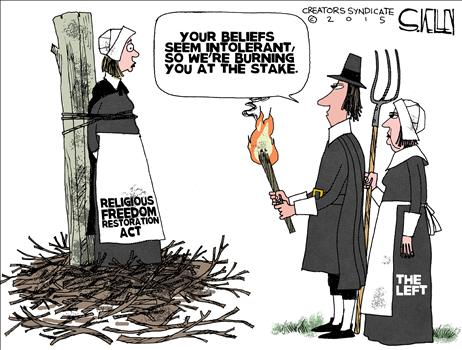
redo Jump to...
print Print...
(by The Editors, The Wall Street Journal) – In the increasingly bitter battle between religious liberty and the liberal political agenda, religion is losing. Witness the media and political wrath raining down upon Indiana because the state dared to pass an allegedly anti-gay Religious Freedom Restoration Act. The question fair-minded Americans should ask before casting the first stone is who is really being intolerant.
The Indiana law is a version of the federal Religious Freedom Restoration Act (RFRA) that passed 97-3 in the Senate and that Democratic President Bill Clinton signed in 1993. Both the federal and Indiana laws require courts to administer a balancing test when reviewing cases that implicate the free exercise of religion.
In other words: Individuals must show that their religious liberty has been “substantially burdened,” and the government must demonstrate its actions represent the least restrictive means to achieve a “compelling” state interest. Indiana’s law adds a provision that offers a potential religious defense in private disputes, but then four federal appellate circuits have also interpreted the federal statute to apply to private disputes.
The federal Religious Freedom Restoration Act (RFRA) followed the Supreme Court’s Employment Division v. Smith ruling in 1990 that abandoned its 30-year precedent of reviewing religious liberty cases under strict scrutiny. Congress responded with RFRA, which merely reasserted longstanding First Amendment protections.
In 1997 the Supreme Court limited the Religious Freedom Restoration Act’s scope to federal actions. So 19 states including such cultural backwaters as Connecticut, Rhode Island and Illinois followed with copy-cat legislation, and Indiana is the 20th. Courts in 11 states have extended equally vigorous protections.
Indiana was an outlier [different from all other states] before the new law because neither its laws nor courts unambiguously [clearly; specifically] protected religious liberty. Amish horse-drawn buggies could be required to abide by local traffic regulations. Churches could be prohibited from feeding the homeless under local sanitation codes. The state Attorney General even ruled Indiana Wesleyan University, a Christian college which hires on the basis of religion, ineligible for state workforce training grants.
In February, 16 prominent First Amendment scholars, some of whom support same-sex marriage, backed Indiana’s legislation. “General protection for religious liberty is important precisely because it is impossible to legislate in advance for all the ways in which government might burden the free exercise of religion,” they explained.
That hasn’t stopped the cultural great and good from claiming Indiana added the religious defense in private disputes as a way to target gays. If this is Indiana’s purpose, and there’s no evidence it is, this is unlikely to work.
The claim is that this would empower, say, florists or wedding photographers to refuse to work a gay wedding on religious grounds. But under the RFRA test, such a commercial vendor would still have to prove that his religious convictions were substantially burdened.
And he would also come up against the reality that most courts have found that the government has a compelling interest in enforcing antidiscrimination laws. In all these states for two decades, no court we’re aware of has granted such a religious accommodation to an antidiscrimination law. Restaurants and hotels that refused to host gay marriage parties would have a particularly high burden in overcoming public accommodation laws.
In any event, such disputes are rare to nonexistent, a tribute to the increasing tolerance of American society toward gays, lesbians, the transgendered, you name it.
The paradox is that even as America has become more tolerant of gays, many activists and liberals have become ever-more intolerant of anyone who might hold more traditional cultural or religious views. Thus a CEO was run out of Mozilla after it turned out that he had donated money to a California referendum opposing same-sex marriage.
Part of the new liberal intolerance is rooted in the identity politics* that dominates today’s Democratic Party. That’s the only way to explain the born-again opportunism of Hillary Clinton,who tweeted: “Sad this new Indiana law can happen in America today. We shouldn’t discriminate against ppl bc of who they love.” [Identity politics is defined as political activity or movements based on or catering to the cultural, ethnic, gender, racial, religious, or social interests that characterize a group identity.]
By that standard, Mrs. Clinton discriminated against gays because she opposed gay marriage until March 2013. But now she wants to be seen as leading the new culture war against the intolerant right whose views she recently held.
The same reversal of tolerance applies to religious liberty. When RFRA passed in 1993, liberal outfits like the ACLU were joined at the hip with the Christian Coalition. But now the ACLU is denouncing Indiana’s law because it wants even the most devoutly held religious values to bow to its cultural agenda on gay marriage and abortion rights.
Liberals used to understand that RFRA, with its balancing test, was a good-faith effort to help society compromise on contentious moral disputes. That liberals are renouncing it 20 years after celebrating it says more about their new intolerance than about anyone in Indiana.
Published March 30, 2015 at The Wall Street Journal. Reprinted here April 1, 2015 for educational purposes only. Visit the website at wsj .com.
Questions
1. What is the main idea of this editorial?
2. What facts do the editors use to support their assertion?
3. Do you agree or disagree with the editors’ conclusion: “Liberals used to understand that RFRA, with its balancing test, was a good-faith effort to help society compromise on contentious moral disputes. That liberals are renouncing it 20 years after celebrating it says more about their new intolerance than about anyone in Indiana”? Explain your answer.

